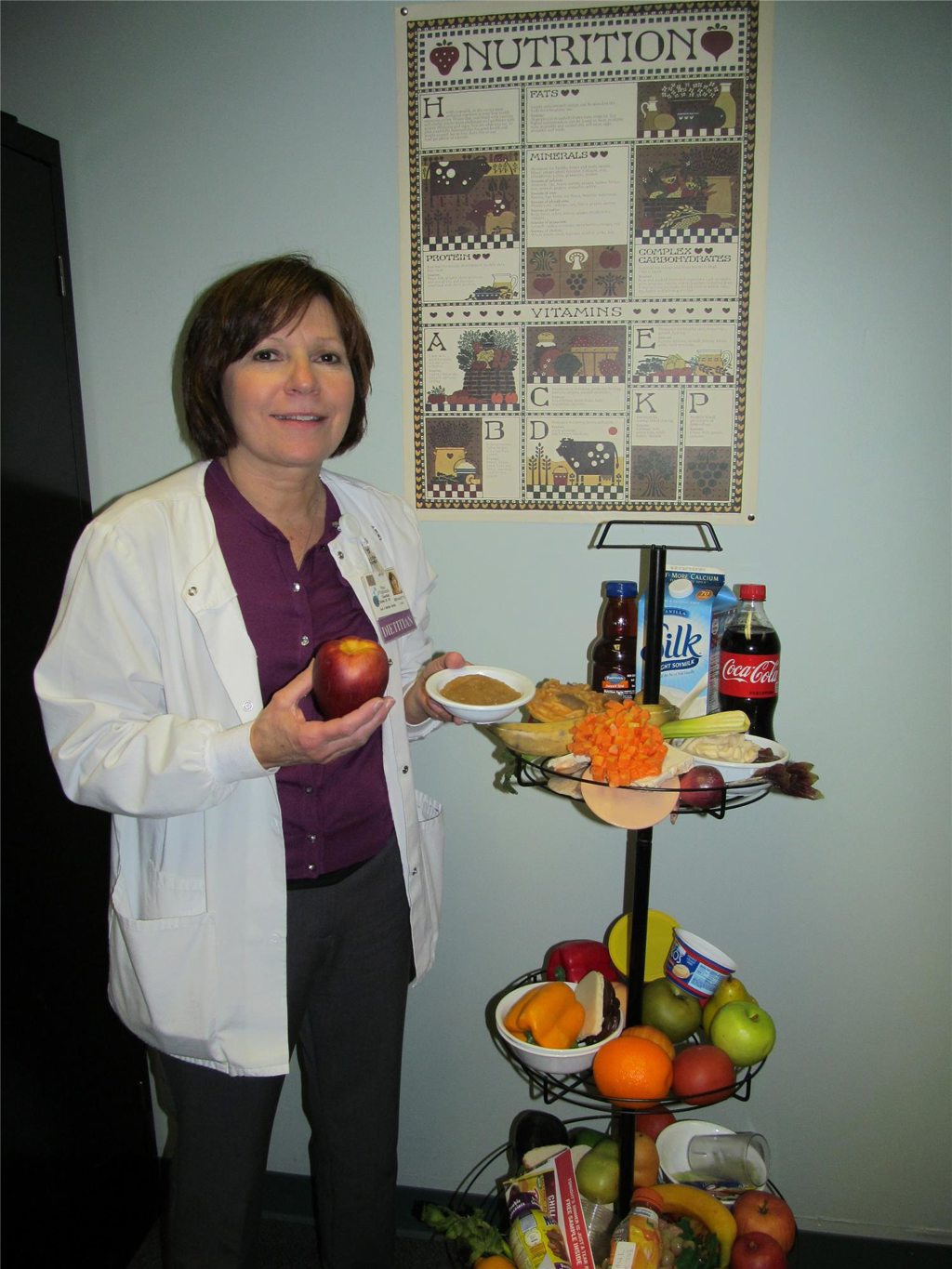March is National Nutrition Month
Healthy food choices and exercise are vital for good health, according to Penn Highlands Clearfield nutrition expert

Nutrition and Food Services personnel at all Penn Highlands Healthcare hospitals are observing National Nutrition Month, a nutrition education and information campaign created annually in March by the Academy of Nutrition and Dietetics. Here, Bernie Clark, dietitian at Penn Highlands Clearfield, displays some of the props she uses when educating patients about how to read labels and portion size.
Are you one of the millions of Americans who made a New Year’s resolution to make healthy food choices and exercise? Did you start off very disciplined but now, a few months in, are starting to slip back into old habits?
It’s not too late to keep that resolution, according to Bernie Clark, dietitian with Penn Highlands Clearfield.
“Falling back into old habits of eating junk food, especially during the winter, isn’t uncommon. It’s never too late to turn things around. Good food choices and regular exercise are two lifestyle changes that can improve your health and reduce your risk of many diseases. Even simple changes such as eliminating soda from your diet can make a big difference. For example, one can of soda every day for one year equals about 15 pounds of weight,” Clark explained.
Now more than ever it’s important to watch what we eat and exercise. According to the Centers for Disease Control and Prevention, more than one-third (34.9% or 78.6 million) of U.S. adults are obese. Obesity-related conditions include heart disease, stroke, type 2 diabetes and certain types of cancer, some of the leading causes of preventable death.
These statistics aren't just impacting adults. Recent statistics show that 16-17 percent of children and adolescents are overweight or obese.
There are two simple things you can do to prevent yourself and your children from joining this group, Clark said. First, watch what you eat. Before you eat, think about how much goes on your plate, bowl or cup. Don’t super-size your meals. Make healthy, nutrient dense (lot of vitamins and minerals) food choices.
Clark outlined food guidelines for building a healthy meal based on “Choose My Plate,” created by the United States Department of Agriculture.
Make half your plate veggies and fruits.
Add lean protein. Choose protein foods such as lean beef and pork, or chicken, turkey, beans or tofu. Twice a week, make seafood the protein on your plate.
Include whole grains. Look for words “100 percent whole grain” or “100 percent whole wheat.”
Don’t forget the dairy. Don’t drink milk? Try soy milk (soy beverage) as your beverage or include fat-free or low-fat yogurt in your meal.
Avoid extra fat. Using heavy gravies or sauces will add fat and calories to otherwise healthy choices.
Take your time. Savor your food. Eat slowly and enjoy the food you eat. Don’t overdo it. Eating very quickly may cause you to eat too much.
Use a smaller plate. A small plate at meals can help with portion control.
Take control of your food. Eat at home more often so you know exactly what you are eating. Enjoy home-prepared foods and decrease processed/fast foods.
Try new foods. Try foods you’ve never tried before, like mango, lentils or kale.
Satisfy your sweet tooth in a healthy way. Indulge in a naturally sweet dessert dish – fruit! Serve a fresh fruit cocktail or a fruit parfait made with yogurt. For a hot dessert, try baked apples and top with cinnamon.
Second, be active at least 30 - 60 minutes each day. Walking is a great way to start your exercise routine. You should limit screen time, whether it is computer or television, to no more than two hours a day.
Nutrition and Food Services personnel at all Penn Highlands Healthcare hospitals are observing National Nutrition Month, a nutrition education and information campaign created annually in March by the Academy of Nutrition and Dietetics.
Registered dietitians throughout Penn Highlands Healthcare can help people achieve their goals of better nutrition and provide one-on-one nutritional counseling for people who suffer from a variety of diseases and medical conditions such as heart disease, diabetes, gastrointestinal disorders, respiratory conditions, renal disease, weight management, eating disorders and others.
For more information, please contact the Penn Highlands Healthcare hospital nearest you and ask to be connected with Food and Nutrition Services.
